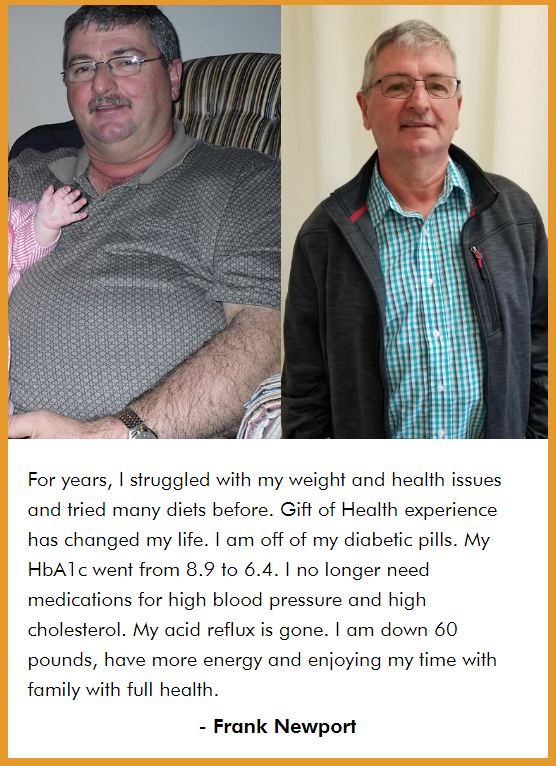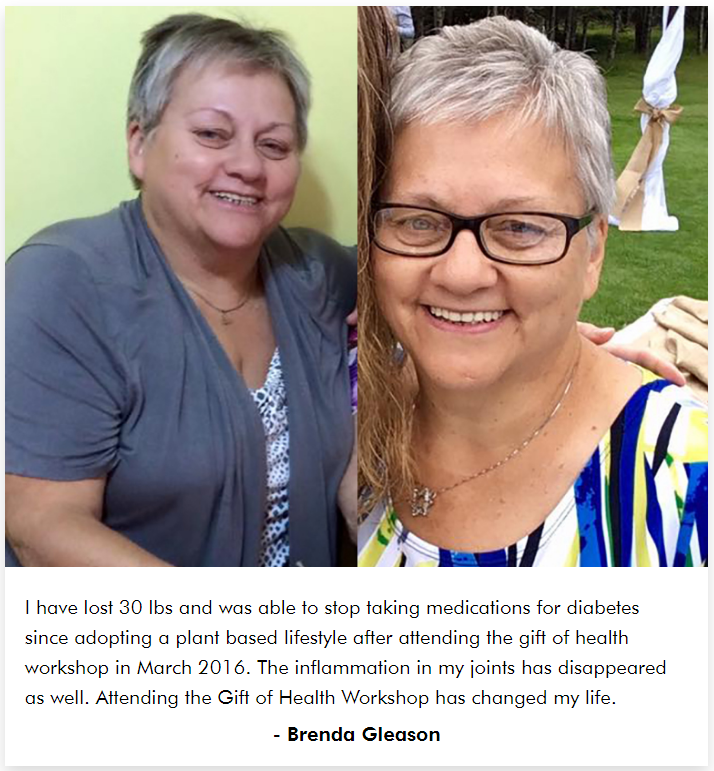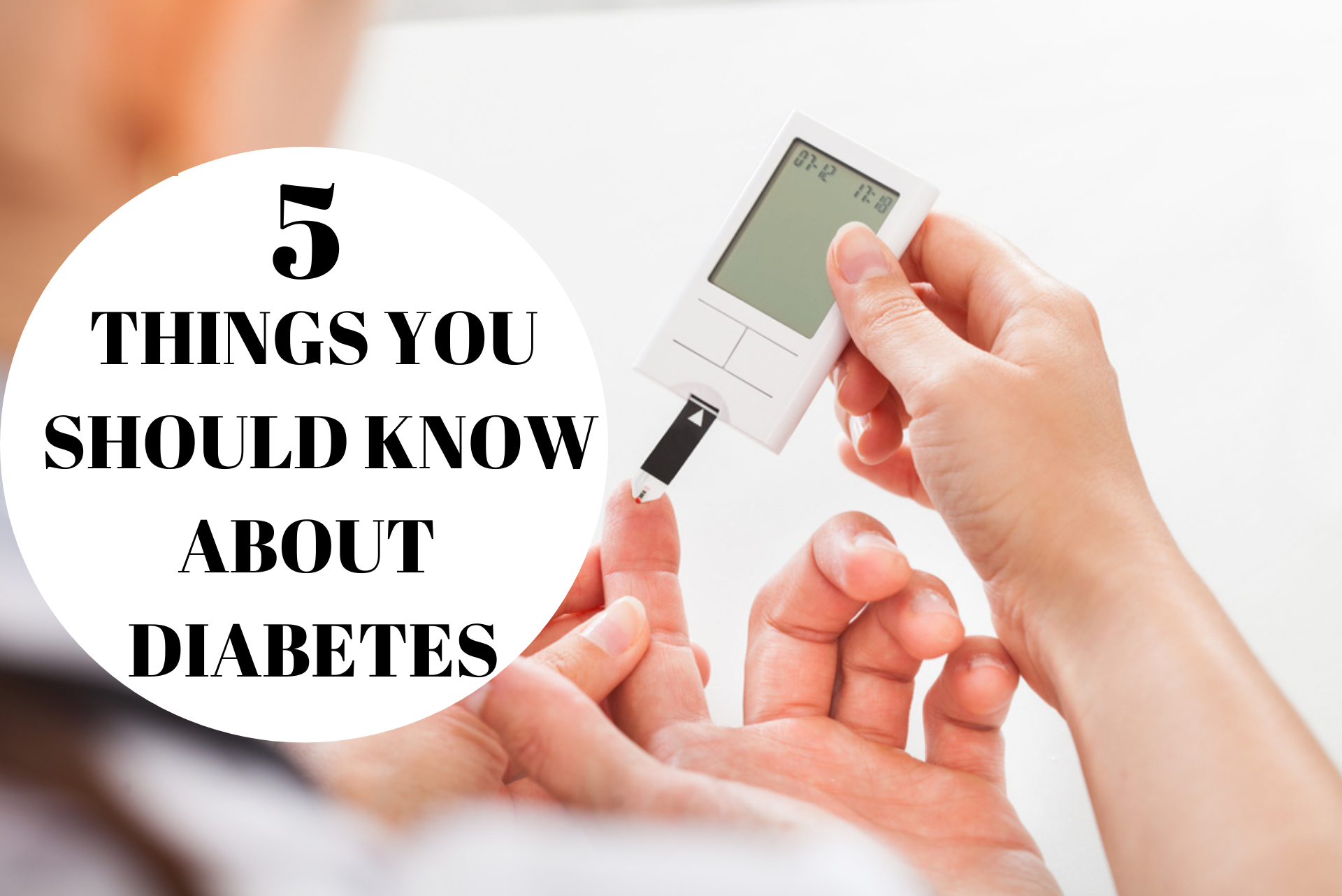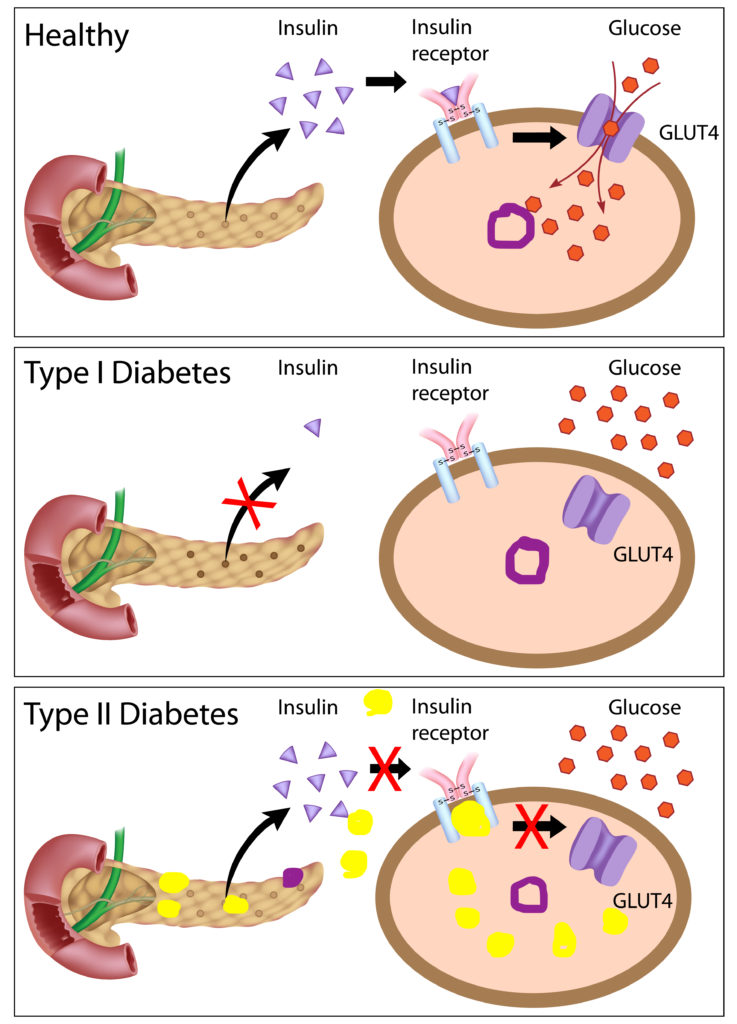#1: Diabetes (Type II) is a reversible disease!
You may have heard that Diabetes usually gets worse over time and your only options are taking medications and insulin to somehow stay ahead of the disease. It does not have to be that way. I want you to know that instead of managing Diabetes you can reverse and in many cases even eradicate it.
#2: Poor diet and lifestyle choices are the leading cause of Diabetes in more than 90% of cases — all of which leads to insulin resistance.
In Type II diabetes, the most common type of diabetes, the body makes insulin but is unable to do its job. Insulin is a hormone made by the pancreas that acts as a key to ‘unlock’ the ‘glucose gate’ and allows the glucose to enter the cells. When you have insulin resistance, the glucose can’t enter cells.
What causes insulin resistance?
Chronic inflammation and excess fat in the cells. Imagine you get home after a long day of work and you take out your key to unlock the door to come into your house. You try to use your key, but someone plugged the lock with a piece of chewing gum. Excess fat in the muscle cells creates toxic breakdown products that get in the way of insulin, blocking the ‘glucose gate’[1]. Instead of powering our cells, the glucose remains in our bloodstream. This process is called insulin resistance, which is the hallmark of Type II diabetes and prediabetes. This is dangerous because increased glucose levels cause inflammation and damage to the small blood vessels, leading to an increased risk of heart attack, stroke, blindness, kidney failure, and loss of limbs.
Having a high glucose level is a symptom of diabetes that’s caused by insulin resistance. Insulin resistance is caused mainly by calorie-rich foods, specifically processed and fried foods loaded with fat and sugars. Meats and Processed foods also promote chronic inflammation, which contributes to insulin resistance [2]. Insulin resistance can happen fast. In fact, it can occur in just two hours after the consumption of an unhealthy meal.
#3: Taking medications and insulin for Type II Diabetes do not treat the cause.
They lower the increased blood sugar levels. As we already mentioned, insulin resistance leads to increased blood glucose. Taking medications and insulin to lower increased blood sugar levels without addressing the root cause is like putting a band-aid on deep-rooted ulcers. The other problem with using medications and insulin is their side effects. It can give you a false sense of security when taking care of your Diabetes without addressing the cause of your Diabetes. Also, in many cases, once you start taking Diabetes medications, you’ll likely have to take them for the rest of your life as they’re intended to focus on the symptoms, not the root cause.
Another issue for people with Type II Diabetes when it comes to taking insulin is that Insulin promotes weight gain. Many people with Type II Diabetes got this disease because they’re overweight and that may be the case for you as well. Taking insulin makes you gain more weight and your Diabetes will get worse if you continue down that path, which is a vicious circle and makes it hard for you to improve your Diabetes while taking insulin.

#4: A plant-based lifestyle can start to reverse Diabetes within a matter of weeks if not even days.
The whole foods plant-based diet can efficiently prevent, manage, and even reverse diabetes because it focuses on the root cause. Plant-based foods are naturally low in fat, which allows insulin to function the right way. Also, whole plant foods are low in processed sugars and high in fiber, which promotes weight loss and reverses insulin resistance.
A diabetes reversal study published in The American Journal of Clinical Nutrition shows that people living with Type II diabetes and injecting up to 32 units of insulin a day for as long as twenty years could get off all their insulin in less than two weeks by following a whole foods plant-based diet high in fibre [3].
Another study, funded by the National Institute of Health, showed that a plant-based diet controls blood sugar three times more effectively than a conventional diet that limited calories and carbohydrates [4]. Within a few days on a plant-based diet, participants lost weight and their insulin sensitivity improved.

#5 Millions of people around the world are waking up to this truth, taking charge of their diabetes, making the necessary changes, and finding freedom from medications, insulin, hospital visits, and medical bills!
My dad cut his diabetic medications in half within two weeks of adopting a plant-based way of eating. In only three months he came off of his diabetic medications after spending over 25 years on them! Many of our students who completed The Gift of Health workshop experienced that same freedom as well. Brenda, Frank, Roy, all of them were able to better manage their Diabetes or even get rid of it altogether by changing their diet and lifestyle.

It starts with leveraging a whole food plant-based way of eating to fuel yourself and letting your food do the work for you instead of relying on medication. You can heal your body by simply changing what you eat and the results may surprise you.
Best of Health and Happiness,
Dr. Arjun Rayapudi, MD
Surgeon and Lifestyle Medicine Doctor
“I can treat you with my surgical knife or I can heal you with my chef’s knife. You pick.”
Check out our upcoming Gift of Health Experience program. This is your opportunity, your mission, if you choose to accept it, is to stop dieting, start losing weight, reduce your dependence on your diabetes medications, and enjoy more energy in six weeks or less with delicious, nourishing plant-based foods that will love you back.
References:
- Michael Roden et al, Mechanism of Free Fatty Acid–induced Insulin Resistance in Humans, J Clin Invest. 1996 Jun 15; 97(12): 2859–2865
- InterAct Consortium, B Bendinelli, D Palli, G Masala, SJ Sharp, MB Schulze, M Guevara, AD van der, F Sera, P Amiano, B Balkau, A Barricarte, H Boeing, FL Crowe, CC Dahm, G Dalmeijer, B de Lauzon-Guillain, R Egeberg, G Fagherazzi, PW Franks, V Krogh, JM Huerta, P Jakszyn, KT Khaw, K Li, A Mattiello, PM Nilsson, K Overvad, F Ricceri, O Rolandsson, MJ Sánchez, N Slimani, I Sluijs, AM Spijkerman, B Teucher, A Tjonneland, R Tumino, SW van den Berg, NG Forouh, C Langeberg, EJ Feskens, E Riboli, NJ Wareham. Association between dietary meat consumption and incident type 2 diabetes: the EPIC-InterAct study. Diabetologia. 2013 Jan;56(1):47-59
- J. W. Anderson and K. Ward, “High-Carbohydrate, High-Fiber Diets for Insulin-Treated Men with Diabetes Mellitus,” Am J Clin Nutr 32, no. 11 (1979): 2312–21.
- Barnard ND, Cohen J, Jenkins DJ, et al. A low-fat vegan diet and a conventional diabetes diet in the treatment of type 2 diabetes: a randomized, controlled, 74-wk clinical trial. Am J Clin Nutr. 2009;89(5):1588S–1596S. doi:10.3945/ajcn.2009.26736H







1 comment
Leave a Reply to shara
Your email address will not be published.